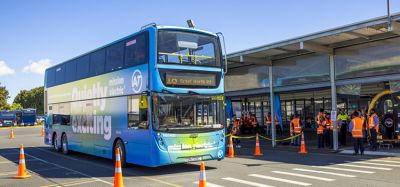UK gets set for hydrogen-fuelled future with Tees Valley-based transport hub
- Like
- Digg
- Del
- Tumblr
- VKontakte
- Buffer
- Love This
- Odnoklassniki
- Meneame
- Blogger
- Amazon
- Yahoo Mail
- Gmail
- AOL
- Newsvine
- HackerNews
- Evernote
- MySpace
- Mail.ru
- Viadeo
- Line
- Comments
- Yummly
- SMS
- Viber
- Telegram
- Subscribe
- Skype
- Facebook Messenger
- Kakao
- LiveJournal
- Yammer
- Edgar
- Fintel
- Mix
- Instapaper
- Copy Link
Posted: 30 September 2020 | Intelligent Transport | No comments yet
Tees Valley set to host UK’s first hydrogen transport hub, bringing together industry and academia to help create hundreds of green jobs.


UK Transport Secretary Grant Shapps has announced the government’s ambition for Tees Valley to become a “trailblazing hydrogen transport hub” while attending the nation’s first ever hydrogen-powered mainline train trial.
Bringing together representatives from academia, industry and government to drive forward the UK’s plans to embrace the use of hydrogen as an alternative fuel could create hundreds of jobs while seeing the region become a global leader in the green hydrogen sector. A government statement says that Tees Valley is perfectly placed to reap these benefits, following the development there of the world’s largest versatile hydrogen refuelling facility, made possible through government funding.
Today’s trials of the train, known as HydroFLEX, which have been supported with a £750,000 grant from the Department for Transport, follow almost two years’ development work and more than £1 million of investment by both Porterbrook and the University of Birmingham.
Unlike diesel trains, hydrogen-powered trains do not emit harmful gases, instead using hydrogen and oxygen to produce electricity, water and heat. The ground-breaking technology behind the trains will also be available by 2023 to retrofit current in-service trains to hydrogen helping decarbonise the rail network and make rail journeys greener and more efficient.
Transport Secretary Grant Shapps said: “As we continue on our road to a green recovery, we know that to really harness the power of transport to improve our country – and to set a global gold standard – we must truly embed change. That’s why I’m delighted that through our plans to build back better we are embracing the power of hydrogen and the more sustainable, greener forms of transport it will bring.”
To kick start development in Tees Valley, the DfT has commissioned a masterplan to understand the feasibility of the hub and how it can accelerate the UK’s ambitions in hydrogen. The masterplan, expected to be published in January, will pave the way for exploring how green hydrogen could power buses, HGV, rail, maritime and aviation transport across the UK. The aim would then be for the region to kick on and become a global leader in industrial research on the subject of hydrogen as a fuel as well as an R&D hub for hydrogen transport more generally, attracting hundreds of jobs and boosting the local economy in the process.
Through the £23 million ‘Hydrogen for Transport Programme’, the plans also include £6.3 million of funding for a green hydrogen refuelling station and 19 hydrogen-powered refuse vehicles in Glasgow – a world-first for the size of the fleet. The government predicts this will give a post-COVID boost to local economies through the creation of green jobs while also decarbonising the transport network.
The next stages of HydroFLEX are already well underway, with the University of Birmingham developing a hydrogen and battery-powered module that can be fitted underneath the train, which will allow for more space for passengers in the train’s carriage.
Related topics
Alternative Power
Related modes
Rail
Related organisations
Department for Transport (DfT)
Related people
Grant Shapps








